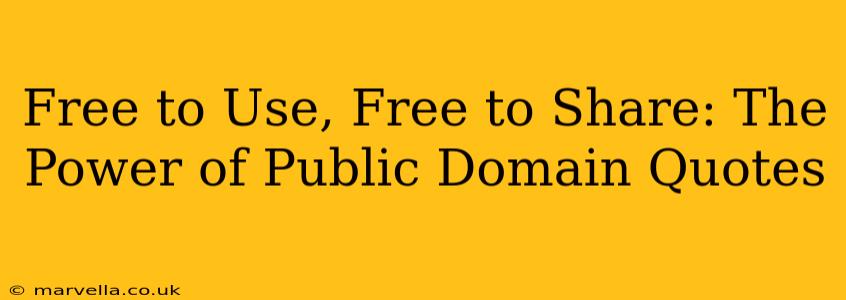The world of quotes is vast and varied, a treasure trove of wisdom, wit, and inspiration. But navigating the legal landscape of quote usage can be tricky. Fortunately, a significant portion of the most impactful and memorable quotes reside in the public domain, offering a wealth of freely accessible material for writers, artists, educators, and anyone seeking to enrich their work with the power of words. This article delves into the benefits and practical applications of public domain quotes, exploring why they're a valuable resource and how to use them effectively.
What are Public Domain Quotes?
Public domain quotes are quotes whose copyright has expired. This means they are no longer protected by intellectual property laws and can be used freely by anyone, for any purpose, without needing permission or paying royalties. The copyright term varies by country and the date of the quote's creation, but generally, works published before 1928 in the United States are now in the public domain. This makes a massive collection of literary and historical gems readily available.
Why Use Public Domain Quotes?
Using public domain quotes offers numerous advantages:
- Legality and Ease of Use: The most significant benefit is the absence of legal hurdles. You can confidently incorporate these quotes into your projects without worrying about copyright infringement.
- Rich History and Cultural Significance: Public domain quotes often come from influential figures and seminal works, lending immediate credibility and depth to your content. They connect your work to a rich historical and cultural context.
- Enhanced Engagement and Impact: A well-chosen public domain quote can significantly enhance the impact of your message, adding emotional resonance and intellectual weight. They can grab the reader's attention and make your point more memorably.
- Cost-Effectiveness: Access to these quotes is completely free, saving you the expense of licensing fees or permissions associated with copyrighted material.
Where Can I Find Public Domain Quotes?
Numerous resources exist to help you discover public domain quotes:
- Project Gutenberg: This online library offers a vast collection of free ebooks, many of which contain quotes from works now in the public domain.
- Bartleby.com: Similar to Project Gutenberg, Bartleby.com hosts a comprehensive library of classic literature, including many works rich in quotable passages.
- Online Quote Databases: Several websites specialize in compiling quotes, many of which explicitly identify those in the public domain. Always double-check the source to confirm the copyright status.
- Academic Databases: Databases like JSTOR and others often provide access to older works now in the public domain.
How to Properly Attribute Public Domain Quotes?
Even though public domain quotes don't require permission, proper attribution remains crucial for ethical reasons and to maintain academic integrity. Always cite the original author and, if possible, the work from which the quote originates. This demonstrates respect for the original creator and enhances the credibility of your work.
What about Quotes from Recently Deceased Authors?
Copyright laws protect creative works for a specific period after the author's death. This timeframe varies depending on the country and specific circumstances. Generally, works created by authors who died recently are not in the public domain. Using them without permission would constitute copyright infringement. Always verify the copyright status before incorporating a quote into your work.
Are there any limitations to using public domain quotes?
While public domain quotes offer considerable freedom, there are some considerations:
- Context is Key: Using a quote out of context can misrepresent the original author's intent and lead to misinterpretations. Always ensure the quote aligns with your intended message and doesn't distort the author's original meaning.
- Trademark Issues: While the quote itself may be in the public domain, any associated trademarks or logos might still be protected. Be cautious when using images or branding associated with the quote's originator.
Conclusion:
Public domain quotes represent a valuable resource for anyone seeking to enhance their writing, presentations, or creative projects. Their free accessibility, historical significance, and impact make them an invaluable tool. By understanding their legal status, utilizing reliable resources, and practicing ethical attribution, you can confidently leverage the power of these timeless words to enrich your work. Remember to always verify the copyright status before using any quote and strive for accurate attribution to uphold ethical standards and demonstrate respect for the original creators.

